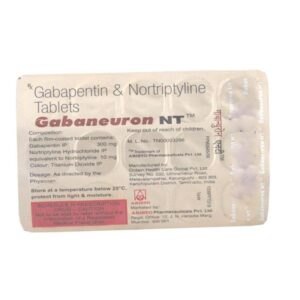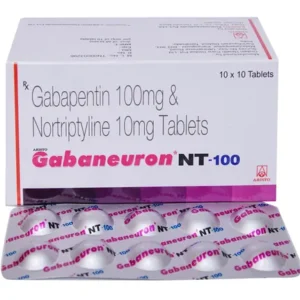GABAPENTIN + NORTRIPTYLINE + METHYLCOBLAMIN
Gabapentin: Gabapentin is a medication that is primarily used to treat seizures and nerve pain. It is also sometimes prescribed off-label for other conditions such as anxiety and restless leg syndrome.
The exact mechanism of action of gabapentin is not fully understood. However, it is believed to work by affecting the release of certain neurotransmitters in the brain, such as gamma-aminobutyric acid (GABA), which helps to reduce abnormal brain activity that can lead to seizures. It may also have analgesic effects by modulating the activity of certain calcium channels.
The dose of gabapentin varies depending on the condition being treated. For seizures, the usual starting dose is around 300 mg taken three times a day, with the dose gradually increasing as needed. For nerve pain, the starting dose is usually lower at around 100-300 mg taken once a day, with the dose gradually increased over a few weeks.
Common side effects of gabapentin include drowsiness, dizziness, and fatigue. Other possible side effects can include blurred vision, weight gain, nausea, and memory problems. In rare cases, gabapentin can cause more serious side effects such as suicidal thoughts, allergic reactions, and liver damage. It is important for individuals taking gabapentin to follow their doctor’s instructions and report any unusual or severe side effects.
Nortriptyline: Nortriptyline is a medication used primarily to treat depression. It belongs to a class of drugs called tricyclic antidepressants (TCAs). Nortriptyline is also sometimes prescribed for other conditions such as anxiety disorders, migraines, and neuropathic pain.
The exact mechanism of action of nortriptyline is not fully understood. However, it is believed to work by increasing the levels of certain chemical messengers in the brain, including norepinephrine and serotonin. By doing so, it helps to improve mood and relieve depressive symptoms.
The recommended starting dose of nortriptyline for depression is usually 25 milligrams (mg) taken orally once per day at bedtime. The dose may be gradually increased by your healthcare provider based on your response and tolerability. The typical maintenance dose ranges from 50 to 150 mg per day, divided into multiple doses. For other conditions like neuropathic pain, the dosage may be different and should be determined by your healthcare provider.
Like other antidepressant medications, nortriptyline has potential side effects. Common side effects may include dry mouth, constipation, blurred vision, dizziness, sedation, increased heart rate, and weight gain. These side effects are usually temporary and may subside over time. However, if they persist or become bothersome, it is important to consult your healthcare provider.
Nortriptyline may also cause more serious side effects in some individuals. These can include an increased risk of suicidal thoughts or behaviors, especially in children, teenagers, and young adults. It is important to seek immediate medical attention if you experience any worsening of depression, unusual changes in mood or behavior, or thoughts of self-harm.
It is worth noting that nortriptyline can interact with certain medications, so it is important to inform your healthcare provider about all the medications, supplements, and herbal products you are taking before starting nortriptyline.
It is essential to follow your healthcare provider’s instructions and guidelines while taking nortriptyline, and to never stop or adjust the dosage without consulting them first. They will provide you with the most accurate and individualized information according to your needs and condition.
Methylcoblamin: Methylcobalamin is a form of vitamin B12. It is used as a dietary supplement and medication to treat vitamin B12 deficiency, certain nerve disorders, and anemia.
The mechanism of action of Methylcobalamin involves its conversion into coenzyme forms, which are essential for various biological processes such as DNA synthesis, red blood cell formation, and nerve cell function. It plays a crucial role in the synthesis of myelin, a substance that coats and protects nerves.
The recommended dose of Methylcobalamin varies depending on the condition being treated. In general, for vitamin B12 deficiency, a typical dose is 500 to 1000 mcg taken orally once daily. However, the specific dosage should be determined by a healthcare professional based on individual needs.
Like any medication, Methylcobalamin can cause side effects. Common side effects may include mild diarrhea, itching, or rash. Some individuals may also experience an allergic reaction, characterized by symptoms such as swelling, severe dizziness, or difficulty breathing. If any of these side effects occur, it is important to seek immediate medical attention.
It’s worth noting that Methylcobalamin may interact with certain medications. Therefore, it is essential to inform your healthcare provider about all the medications, supplements, or herbal products you are taking before starting Methylcobalamin.
Overall, Methylcobalamin is a medication prescribed to treat vitamin B12 deficiency and associated conditions. Its mechanism of action involves supporting various essential biological processes. When used under medical supervision, it can be effective in treating specific conditions while minimizing the risk of side effects.


